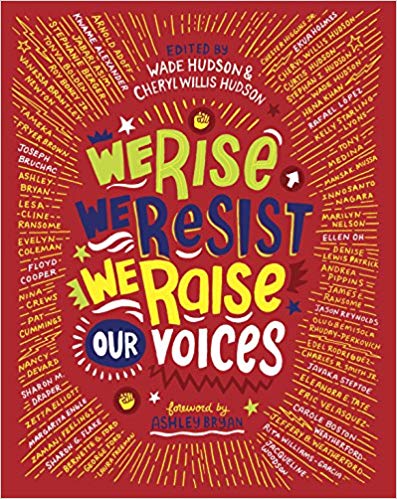Wade Hudson – We Rise, We Resist, We Raise Our Voices Audiobook
Wade Hudson – We Rise, We Resist, We Raise Our Voices Audiobook

We Rise, We Resist, We Raise Our Voices Audiobook Online
How can we make use of this? book What is the purpose of this activity in the classroom? Customers have also eloquently described the beauty of the writing from a diverse group of voices. book. (I was influenced to do so by the book You can also use the guide to assess your work! If you own a smartboard I would purchase the Kindle version and also use it to analyze, enjoy, and also go over the 9th through 10th qualities. Many items are suitable for students or educators.-Led discussions– which can be used with students at all ages.
Upload the poem ‘Roll for Modification’ by Kelly Starling Lyons to center-grade students. It should be read aloud. Then ask students to continue reading it and have them enjoy checking out with a friend. The rhyme’s introduction is quite attractive. “This world feels upside down.”-In some cases it can feel like a twisted house of mirrors, where people are held accountable for bullying …”. Carefully read and discuss certain lines such as, “Together we are a hill that no one can damage” as also “When you feel scared or upset, remember what you have within.” We Rise, We Resist, We Raise Our Voices Audiobook Free. Ask your pupils to ask questions such as “Why is this important to someone?” Or, “This is the market that the author targets?” Also, “How does the writer connect with her audience?”
Post the image by Rafael Lopez (for Margarita Engel’s poem All Countries Are Neighbors as Well as I Wonder’). Give the trainees some quiet time to examine the image and take note. It is possible to ask, “What do I see?” Then, you might ask “What are your thoughts?” After that, check out the rhyme. To compare and contrast, you can use the image as well as the poem. “Exactly how can these two “texts” support one another?”
Upload the following rhyme to intermediate and high school students.-It is important for students to read and review the Ransome. Ask students to reflect on this question: “What resonates with me?” Also, consider “What does the word ‘following” mean for a concept in this piece?” Also, “How does the author use background to show us how we can keep growing strong and high’?” This rhyme could be easily incorporated into history/social researches classes.).
As a teacher of composing workshops, you have endless possibilities for using this text to mentor authors.-12. Many styles, voices, and uses for literary gadgets. Seriously. Perhaps I will continue.
As an instructor, you can take the publication home and read a section each night. Mentoring can be hard work. Many times, we have to carry the concerns of our students with us. These words are both inspiring and relaxing.
Please share this publication with ALL pupils – not just those who feel they are marginalized, bullied or experience racism. We We may not be able to answer all of the worries of our students. This publication contains words of concern for them that we might not realize. There is also space for conversation, even if the material doesn’t resonate with them. Conversations about the world beyond their classroom walls are possible. You don’t have to be shy about discussing national politics in class. This publication can still be used in your training sessions with trainees. Wade Hudson – We Rise, We Resist, We Raise Our Voices Audio Book Online. This book It matters, in many ways, beyond the current political landscape. Ashley Bryan says, “I will most likely use these words to describe this publication. We Surge, We Resist, We Raise Our VoicesYou will be lifted up by their words.” Editors Wade Hudson Cheryl Willis as well Hudson In their introduction, they mention that they were inspired to do so by seven of their friends-Year-An upset granddaughter was very upset about the results of the 2016 presidential electoral election. They say she was scared and confused, afraid that her world might change. They thought about what they could say to her and what words of consolation they could offer.
For every double, they have thirty authors and almost as many illustrators.-Page item to share those words of love and hope. Carole Boston Weatherford’s poem, illustrated by Jeffery Weatherford, mentions The Principle. Kwame Alexander’s tale is illustrated by Ekua Holmes and concerns a night he spends getting ice cream with his child. Each editor contributes a piece. Wade inquiry “What Shall We Do?” We How can I help you? It was accompanied by a touching picture of Floyd Cooper’s mother and child. Cheryl shared a patchwork that she made for the song, “The Gospel Train”.-Class aboard the train/ No difference in the fare Ellen Oh, Margarita Engle, Hena Khan … I could go on. Every piece is beautiful in its message and in its art.
